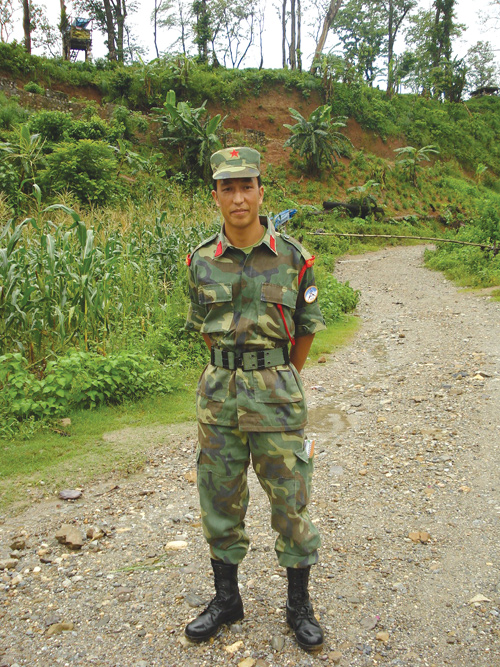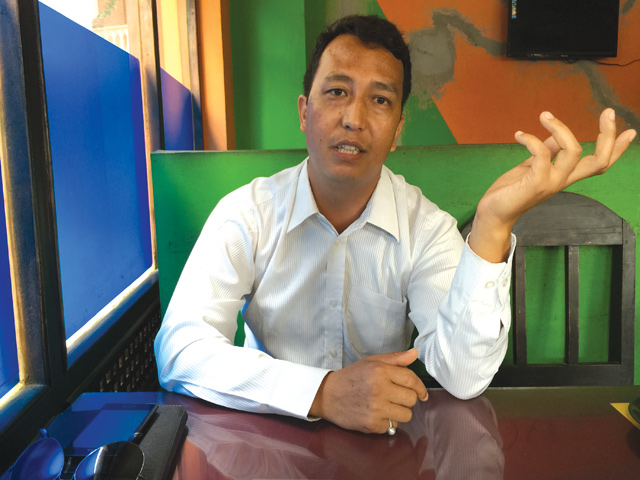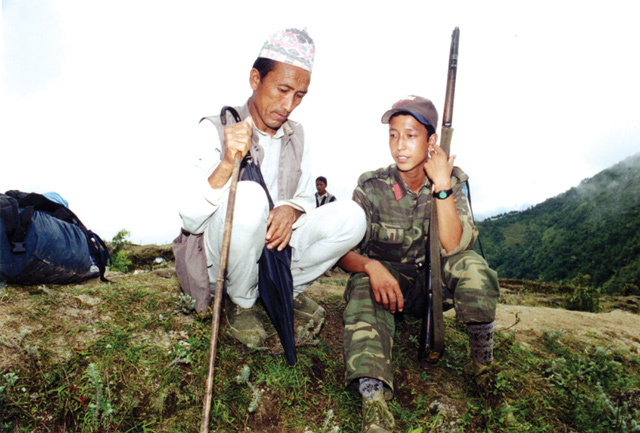(WAR MEMORY: Mukunda Bogati’s photograph of child soldier Tej Bahadur Dong, in Ramechhap (2001). His uncle was trying to talk him into going back home to his parents)
A former Maoist child soldier is disappointed his dreams of revolution were dashed
Tej Bahadur Dong was 15, and father to a child, when he joined the Maoist militia in 2001. After months of waiting for him to return, Tej Bahadur’s parents sent the boy’s uncle, Bhim Bahadur Tamang, to meet him at a guerrilla camp in Ramechhap to convince him to come home.
The two were sitting on a ledge, the boy cradling a long .303 rifle, deep in conversation with his uncle. Kantipur reporter Mukunda Bogati spotted them, and remembers being touched on spotting such a young boy in military uniform. He snapped a picture and wrote an accompanying story which was published in Kantipur. It brought the reality of the conflict to readers nationwide.
“I was instantly moved on seeing the young boy in a combat dress, and I think it was one of the few pictures from the war that depicts the use of child soldiers,†Bogati told Nepali Times. The photograph was selected for A People War, the trilogy of photo books on the Maoist conflict.
Almost one-and-half decades later, Dong is now 34, and lives in a rented room in Kathmandu with his family. He has memories of more than 30 battles he participated in, and nods as he compares it with the current political situation. “I regret that we couldn’t be agents of change the way we hoped to be,†he says.

His military uniform is still stored, neatly folded, inside a wooden cupboard on the ground floor of a three-storied building at Balaju Height. He hasn’t worn them since he opted forvoluntary retirement in 2010.
Tej Bahadur was married, had become a father and a revolutionary guerrilla — all before he was 15 years old. He says he joined the Maoists to protect himself from being detained and killed by the police, and after indoctrination by the party, fervently believed that he could make a difference by creating a classless society.
“It is difficult to see any dramatic changes that the conflict brought to the country, I feel like we sacrificed our lives for nothing,†says Dong, listing lack of opportunities, unemployment, slow-paced development, poor health care and political instability among an array of problems nepalis are faced with.
He got Rs 100,000 when he left the UN-supervised Shaktikhor Interim Camp in Chitwan where he served as a battalion deputy-commander. He chose voluntary retirement because he didn’t get promoted to Major in the Nepal Army.
Altogether 1,420 Maoist guerrillas were integrated into the Nepal Army and out of them, only one became a Colonel, two were Lt Colonels and 13 became Majors.
He lived with his two sons and wife in Chitwan, but moved to Kathmandu because he was ostracised by neighbours for being a Maoist. “I was driven to depression by the way we were treated.â€

He is now dependent on his wife’s income from knitting and weaving, to run the household and to pay the monthly rent. He dabbled in pig farming in Kathmandu investing his compensation money on it, but it failed. He has sold his ancestral property in Ramechhap to pay for his sons’ education in Kathmandu.
Dong regrets not having gone to college, he joined the Maoists soon after his SLC. “I was trained to use guns, but where will I get a job that matches my experience now?â€
Dong is still affiliated with the CPN (Maoist –Centre) of his erstwhile Supreme Commander Prachanda, who is now Prime Minister. As a member of the Kathmandu District Committee he says communism still flows in his blood. But he no longer introduces him by his nom de guerre, Urja.  He doesn’t think about the future anymore, and takes each day as it comes, leaving everything to fate. He wants to invest in his children’s education so they will have a future.  He adds: “This combat dress is my history, it feels good to replay the memories of a time when I fought for the future of my country.â€
By Shreejana Shrestha







